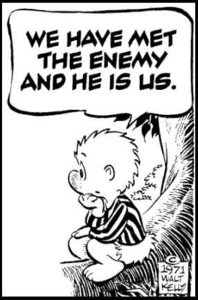We have seen the enemy and he is us. So were the immortal words of the great
American philosopher Pogo, the satirical cartoon creation of Walt Kelly. That droll quip speaks to a dark sinister
reality about what is happening in the Jewish world, in direct contrast to the
warning offered by Parshat Tzav.
God directs Moses to command the priests on what to do and
how to do it as they fulfill their sacred responsibilities on behalf of the
people Israel. It is clear that the
sacred tasks require special ways of acting.
There is too much at stake; for these are the priest making offerings to
God on behalf of God’s people. The
priest learn the strict code to which they must adhere. Deviating is not acceptable, and the
consequences can be severe, as Nadav and Abihu will learn.
Later on, we learn that the nation itself is a nation of
priests. That we as a nation are
similarly charged with a series of behaviors that are required of us to fulfill
our responsibilities. These laws are put
forward in Torah and then developed by the rabbis and shared in the Oral Torah and the great
works that expound upon these laws. Like
our priestly class, the nation of Israel is bound to the laws of Torah on how
to act in order to fulfil our sacred responsibilities of being a light to the
nations.
That light has been dimming as a result of a move away from
our role as faithful servants to
something that embodies a hubris endangering and attacking our core
values as a people. We have moved from
the sacred work of Sanctifying God’s name to profaning God’s name, from Kiddush
ha-Shem to Hillul ha-Shem.
At the most recent Rosh Chodesh at the Kotel we witnessed a
brutal and tragic display of violence against the Women of the Wall. We do not agree on how we should engage in
ritual. I respect other approaches to
Judaism, even though I do not practice them.
Likewise, there are many who would see my religious practice as
unacceptable. However deep the
disagreements may be, there is no justification for the violence perpetrated on
the Women at the Kotel. I would argue
that the shouting is an undermining of the special space that is the Kotel and
place. But physical battery is
blasphemy, plain and simple. It curses
God’s name and everything that Judaism is supposed to represent. In the name of the sacred, everything sacred
has been trashed, God’s great name was trampled in the mud. The violent encounter was in violation of all
of Jewish Law and culture. This moment
is a tipping point for us as a people. And this is not the only arena where our
behavior needs to be critically examined. Tzav, commanded behaviors, require
adherence to standards of decency and ethics.
Are we acting as God has directed?
There is a rise in racism in Israel is an insidious cancer eating
away at the very soul of the State. This
racism dehumanizes the non-Jew, whether they be citizens of Israel or Palestinians
of the West Bank and Gaza. The inability
to see the other as one with fundament human and civil rights, entitled to
dignity and respect, undermines the ideals of both the Jewish State and the
Jewish religion.
The violent racist Kahanists, Otzmah Yehudit, have a new-found
acceptance in Israeli politics. The inclusion
of these group dedicated to an extreme racist view, enforced by thuggery,
should be unthinkable, but instead of repudiating them and everything they
stand for, they are legitimized and welcomed.
There are appeals to the courts seeking redress, but ultimately the
Israeli people must speak out unequivocally against this base and baseless
hatred.
This issue also confronts American Jewry. As anti-Semitism is on the rise, American
Jews must respond. The manner in which
we move forward will determine if we are no better than those who hate us. Can we be strong and resolute without
resorting to similar tactics as those whose ideas we find dangerous and
contemptible? Can we find sufficient security in this extraordinary place and
time in our history to battle anti-Semitism and not feel disenfranchised by
those contemptible people on the margins of society who seek to do us harm?
The second temple was destroyed, our sages say, due to Sinat
Chinam, the baseless internecine warfare that existed within the Jewish
people. Instead of a tolerant society
with many different interpretations of Judaism, the People of Israel became a
fractious group of competing sects intent on imposing their particular view on
everyone, ultimately sacrificing everything.
Can we reclaim the ideals of Klal Yisrael, or is history repeating
itself?
Our leaders from across the breadth of our tradition
including Rabbi Nachman the Hasidic
master, Rav Kook the founder of religious Zionism, and Rabbi Abraham Heschel an
American Prophetic voice, to name only three,
all warned against hatred against others,
no matter how deeply offensive we might find certain practices. They encouraged us to embrace the best of our
tradition so that we may bring forward our values in the world. Tzav
as part of the book of Leviticus, as part of Torah, lays out the rules for how to act as a people in sacred service to God. These rules are based on core values that are
central to every expression of Judaism, religious, ethnic, and cultural. When we violate the values that are at our
core, we betray the sacred aspirations of
our tradition. Tzav reminds us of our duties and sacred obligations and
admonishes us not to stray. Tzav demands more of us, we need to take heed
and act better.



